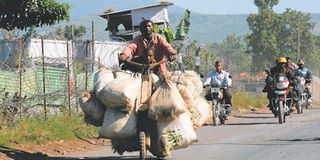Goma rides on the back of a wooden bicycle

A wooden frame bicycle, the chukudu, is used to transport goods to the market in Goma. Photo/WILLIAM OERI
Necessity is the mother of invention. And indeed some have taken the call for local inventions a notch higher.
Residents of Goma in the Democratic Republic of Congo will this Christmas have no transport problems as they rely on a local model to place food on their tables.
The chukudu, the handmade hewn wooden bicycle, rules the road — or what is left of it after pot holes — and has a right of way in this town in eastern Congo.
It is used to transport luggage and is a favourite with the young men who use it to transport farm produce from farms to markets, and vice versa.
The chukudu is to Goma what the bicycle is to Amsterdam, the mkokoteni (cart) to Nairobi and the horse-drawn carriage to New York’s Central Park.
The chukudu, a marvel of practical engineering and endurance, is available in three models — small, medium and large and depends on the needs of each family.
In this country shattered by decades of civil war and rasping poverty, Goma residents have gone green and use this unique mode of transport may do not pollute the environment like the modern vehicles do, but sure consumes wood.
It has a step-through frame and a platform for the operator’s feet. “They are also very easy to make and maintain so almost everybody owns one,” Jean Claude who owns a chukudu told the Nation.
Every young man in this town boasts of being an “engineer” because they have assembled the chukudu at one point in their lives.
The lava-covered streets of Goma town are full of the chukudu that are mostly driven by one person and pushed by at least two porters. The men of Goma rarely carry back-breaking loads thanks to the chukudu.
To some residents, it is a thriving business as they hire out the chukudu for Sh800 per day and are able to meet their basic needs.
Residents dislike the slow convoys of white armoured cars, trucks and bulldozers of the UN peacekeeping forces and those of the numerous NGOs that spew clouds of exhaust and routinely clog traffic.
Most women prefer to walk, as public transport is rare and expensive. They dress in brightly coloured three-piece vitenges, and struggle with baskets on their heads, perhaps with a child strapped on their backs.
The men ride the chukudu. They only transport their wares, leaving women to walk long hours to cover the same distance.
Whistling along the streets is common as it is used to signal to pedestrians that the chukudu is on the way and visitors are warned to heed to the warnings lest they are knocked down on the dusty streets.
Meat is also transported using the same mode, but with one of the riders holding it against a polythene bag, in a manner most unhygienic. Public health officials are nowhere in sight.
However, not even the octogenarians of this old town can trace who invented the chukudu which is popular in most, if not all households.
Though the chukudu looks pre-industrial, residents say they date from the 1970s, when Congo’s economy and government began to collapse under the rule of dictator Mobutu Sese Seko and people had to improvise, from schools to transport.
According to one resident, Mr Francis Nzarubara, the scooter was named according to the sound it makes, while in motion against the pot hole-filled road: “chu-ku-du, chu-ku-du, chu-ku-du”. A chukudu costs around $60 (Sh4,800).




